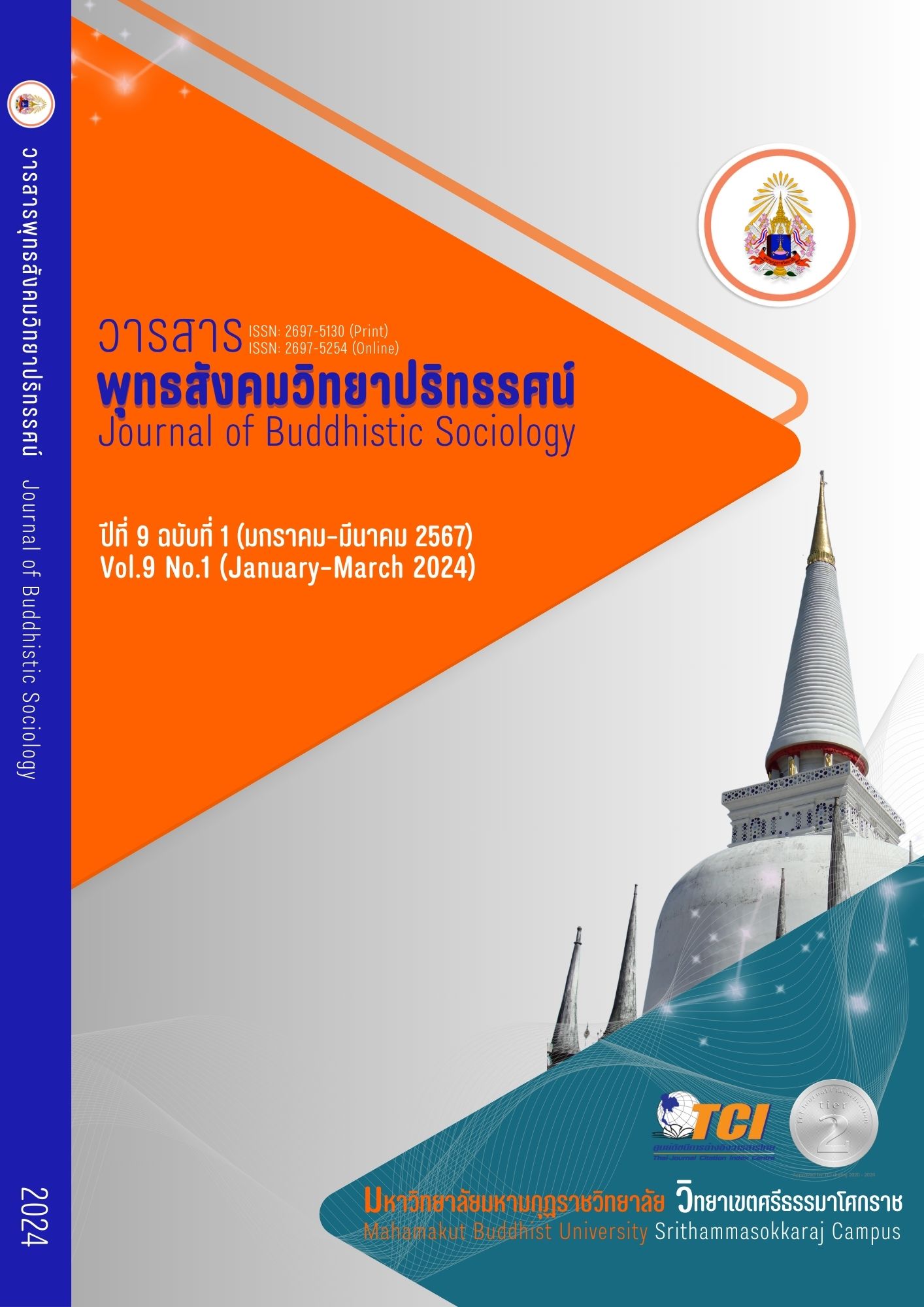RESPONSIBILITY, FAITH, CREDIBILIGY, PARTICIPATION AND VALUE THAT INFLUENCES FOR GOOD MANAGEMENT IN BUDDHISM
Main Article Content
Abstract
This study aimed to study 1) the opinions’ level of responsibility, faith, reliability, participation, worthiness, and good management in Buddhism, 2) the direct and indirect influences of responsibility, faith, reliability, participation, and worthiness on the good management in Buddhism, and 3) the guidelines of good management development of Buddhism. This research employed the mixed method between quantitative and qualitative research. The data for the quantitative method were collected by the questionnaires from 360 people living in Klong Sam Wa Area of Bangkok. These 360 people were from five districts: Eastherm Sam Wa, Western Sam Wa, Bang Chun, Sai Kong Din, and Southern Sai Kong Din. The sample size was determined through a criterion with 20 times of 18 observed variables. The sample group was selected using a stratified sampling method and analyzed with a structural equation model. The data for qualitative method were collected using in-dept interview with key informants: in temple such as eight Buddhist ecclesiastical official monks as the abbots of the temple, seven related temple staff: four churchwardens and three liaisons. These key informants were chosen by the purposive sampling and were checked to pass the target group qualification following specified criteria. The data were analyzed under the objectives of the content through observation and group discussion.
The research found that:
- Worthiness, reliability, good management in Buddhism, participation, and responsibility were at a high level, while the faith was at the highest level. Overall, these aspects were at a high level (
=4.48, S.D.=0.44)
- The influence of responsibility had the most direct effect on faith, at 0.46, followed by reliability at 0.33, participation at 0.22, worthiness at 0.19, and good management in Buddhism at 0.15, respectively. The influence of responsibility had an indirect effect on good management in Buddhism at 0.33, followed by worthiness at 0.24, participation at 0.22, and reliability at 0.09, respectively.
- The relationship model for developing good management in Buddhism consisted of faith, worthiness, reliability, good management in Buddhism, participation, and responsibility. It was a guideline for developing a comprehensive temple management method to achieve efficiency in sustainable management in the future.
Article Details

This work is licensed under a Creative Commons Attribution-NonCommercial-NoDerivatives 4.0 International License.
References
กรมการศาสนา. (2564). สัดส่วนผู้นับถือศาสนาพุทธและศาสนาอื่น ๆ. เรียกใช้เมื่อ 15 มกราคม 2565 จาก https://e-ervice.dra.go.th/religion/buddhism?type=10.
กรรณิกา ขาวขุ่น. (2560). ความรับผิดชอบ. เรียกใช้เมื่อ 15 มกราคม 2565 จาก https://saoc.rtaf.mi.th/images/OneDsOne_ARTICLE/02Responsibility.pdf.
กฤษณา พันธุ์มวานิช. (2561). คุณธรรม ความรับผิดชอบ ตามแนวพระราชดำริพระบาทสมเด็จพระเจ้าอยู่หัว รัชกาลที่ 9. กรุงเทพมหานคร: สำนักงานคณะกรรมการวัฒนธรรมแห่งชาติ กระทรวงวัฒนธรรม.
กาญจนาณัฐ ประธาตุ. (2560). พุทธศาสนากับสังคมไทย: การยืนหยัดและท้าทายในรอบทศวรรษ (พ.ศ. 2548-2558). วารสารศิลปการจัดการ, 1(2), 103-118.
ณดา จันทร์สม. (2558). การเงินวัด ต้องโปร่งใส ตรวจสอบได้ คณะพัฒนาการเศรษฐกิจ สถาบันบัณฑิตพัฒนบริหารศาสตร์. เรียกใช้เมื่อ 15 มกราคม 2565 จาก https:// forbesthailand.com/commentaries.
ณรงค์ กุลนิเทศ และสุดาวรรณ สมใจ. (2558). ระเบียบวิธีวิจัยชั้นสูง และการออกแบบวิจัย (พิมพ์ครั้งที่ 2). กรุงเทพมหานคร: มาสเตอร์พรินท์ สามเสน.
ณัฐวุฒิ เงินท้วม. (2563). มาตรการทางกฎหมายเกี่ยวกับอำนาจและหน้าที่ของเจ้าอาวาสตามกฎหมายว่าด้วยคณะสงฆ์. วารสารวิจัยมหาวิทยาลัยเวสเทิร์น มนุษยศาสตร์และสังคมศาสตร์, 6(2), 72-81.
ทักษิณาร์ ไกรราช และคณะ. (2561). การธำรงไว้ซึ่งพระพุทธศาสนาในสังคมไทยสมัยใหม่ผ่านมิติปราชญ์ทางพระพุทธศาสนา. วารสารสันติศึกษาปริทรรศน์ มจร, 6(2), 819-830.
ปัณณธร เธียรชัยพฤกษ์ และคณะ. (2564). กลยุทธ์การบริหารกิจการคณะสงฆ์เพื่อเสริมสร้างความมั่นคงของพระพุทธศาสนา. วารสารมหาจุฬานาครทรรศน์, 8(5), 378-392.
พระครูธีรธรรมพิมล (ทิม ทองจันดา) และศรุดา สมพอง. (2562). การปฏิรูประบบบริหารภาครัฐในบริบทของสงฆ์ไทย. วารสารมหาจุฬานาครทรรศน์, 6(10), 6054-6070.
พระครูวิจิตรธรรมาทร (เรียน ติสฺสวํโส) และคณะ. (2562). การสังเคราะห์แนวคิดภพภูมิในพระไตรปิฎกที่ปรากฏในไตรภูมิพระร่วง. วารสารบัณฑิตศึกษามหาจุฬาขอนแก่น, 6(4), 427-438.
พระครูอดุลสามัคคยาธร (แสงจันทร์ เจริญคง) และคณะ. (2563). บทบาทของเจ้าอาวาสในการบริหารจัดการวัดในสังคมไทยปัจจุบัน. วารสารมหาจุฬานาครทรรศน์, 7(5), 102-116.
พิพัฒน์ นนทนาธรณ์. (2554). แนวปฏิบัติด้านจริยธรรมธุรกิจองค์กรในเขตกรุงเทพมหานคร ใน รวมบทความประชุมวิชาการทางพระพุทธศาสนานานาชาติ ครั้งที่ 8 เนื่องในวันวิสาขบูชา วันสำคัญของสากลโลก (พิมพ์ครั้งที่ 1). กรุงเทพมหานคร: เซ็นจูรี่.
ยัง กุนอก. (2559). การศึกษาหลักศรัทธาตามแนวคิดพระพุทธศาสนาเถรวาทของชาวพุทธจังหวัดอุบลราชธานี. วารสารมนุษยศาสตร์และสังคมศาสตร์ มหาวิทยาลัยราชภัฏอุบลราชธานี, 7(1), 68-76.
สำนักงานเขตคลองสามวา ฝ่ายพัฒนาชุมชนและสวัสดิการสังคม. (2563). ชุมชนในพื้นที่เขตคลองสามวา. เรียกใช้เมื่อ 15 มกราคม 2565 จาก https://webportal. bangkok.go.th/khlongsamwa/ page/sub/188.
อาทิตย์ แสงเฉวก และคณะ. (2562). กระบวนการทุจริตในวงการพระพุทธศาสนา. วารสารมหาจุฬานาครทรรศน์, 6(10), 5989-6000.
Gliem, J. & Gliem, R. (2003). Calculating, interpreting, and reporting Cronbach’s alpha reliability coefficient for Likert-type scales. In 2003 Midwest Research to Practice Conference. 82-88.
Gray, B. . (1989). Collaborating: Finding Common Ground for Multiparty Problems. San Francisco: Jossey –Bass.
Huntsman, J. (2018). Credibility. Thailand: HUNTSMAN ICI. .
Portney, L.G. & Watkins, M.P. (2015). Foundation of clinical research: Applications to practice (3rd ed.). Upper Saddle River: Pearson Education, Inc.


